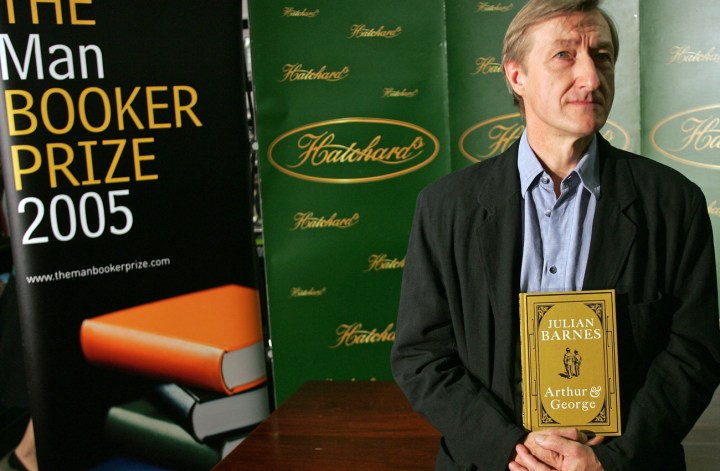The man who once called the Booker Prize “posh bingo” has just been shortlisted for the fourth time. Below is a list of reasons why he should finally win it this year, and an equally compelling list of reasons why he may not – chief amongst the latter being that, as ever, the Booker is just plain unfair. By KEVIN BLOOM.
The following sentence doesn’t really mean anything: At 13/8 Ladbrokes odds, Julian Barnes, who has been shortlisted four times but never won, is already the bookies’ favourite. The following sentence does: Barnes’s The Sense of an Ending is one of six books on this year’s Man Booker Prize shortlist, and it’s the work of a person who’s deservedly hailed as one of the world’s most distinguished writers. Implying, with prizes like the Booker and just about every other literary award going, it’s always safer (as in, based more deeply in reality) if authors are pleased simply to be on the final list of nominees.
But authors aren’t, of course; like the rest of the world, authors want to win. Good thing for Barnes, then, that every review of his latest book has been scintillating. “With its patterns and repetitions,” wrote Justine Jordan in the Guardian recently, “scrutinising its own workings from every possible angle, the novella becomes a highly wrought meditation on ageing, memory and regret. But it gives as much resonance to what is unknown and unspoken – lost to memory – as it does to the engine of its own plot.”
Which is typically Barnesian – his 2008 non-fiction work, Nothing to Be Frightened Of, focused on the same themes – and which is why, despite being born in Leicester, he is the only writer to have won France’s Prix Médicis and Prix Fémina. Barnes is also a Commandeur de l’Ordre des Arts et des Lettres, and a recipient of the Somerset Maugham Award, the Geoffrey Faber Memorial Prize, the E.M. Forster Award from the American Academy and Institute of Arts and Letters, and the San Clemente literary prize. This year, he was awarded the David Cohen Prize for Literature, a biennial prize that honours a lifetime’s achievement. All that’s missing from the list is a Nobel and a Booker, the former a long shot (the Nobel committee seems to have developed a distaste of late for authors of Barnes’s profile) and the latter now a very real possibility.
If literary prizes were an exact or even a fair science, Carol Birch and A.D. Miller, at 7/2 odds, would do well to beat Barnes. But they’re not; they’re partial, subjective, influenced, limited and unjust. Not that Birch and Miller aren’t great writers – whatever else you can say about the Booker, you cannot say that people who can’t write make it onto the shortlist – just that this should be Barnes’s year. Why? Because, well, it kind of feels that way; and because the Booker judges have always hated Martin Amis, and to give the award to Barnes, a contemporary and friend of Amis, would make Amis mad.
Still, here’s the opening passage from Birch’s Jamrach’s Menagerie: “I was born twice. First in a wooden room that jutted out over the black water of the Thames, and then again eight years later in the Highway, when the tiger took me in his mouth and everything truly began.” If anything, an amalgamation of Jeffrey Eugenides’s Middlesex – whose protagonist was also born twice in the first sentence, first as a girl and then as a boy – and Yann Martel’s Life of Pi, where a tiger lands up in a small boat with the only survivor of a shipwreck. Given that Eugenides won the Pulitzer and Martel the Booker, Birch could be in with a shout.
Miller? He’s kind of different. Noted The Independent: “A former Moscow correspondent for The Economist, A.D. Miller is an expert on the land of contradictions that is post-Communist Russia. His debut novel is an electrifying tour of the dark side of Moscow, and of human nature.” Probably a bit too – something, I don’t know, but something – to win the Booker, although you never can tell.
At 9/2, 13/2 and 8/1 at Ladbrokes respectively, Stephen Kelman, Esl Edugyan and Patrick deWitt are the bookies’ outsiders. Pertaining to Kelman and deWitt, I recently received the following release from House of Anansi Press, who published my own book in Canada last year. “We are beside ourselves with joy that these two extraordinary novels [Pigeon English and The Sisters Brothers] have been recognized by being considered for this prestigious literary award. House of Anansi was last recognized by the Man Booker Prize in 2010 when February by Lisa Moore was on the longlist. We have never before had a novel advance to the shortlist! So we are very proud that two novels from our list have been honoured this year.”
Needless to say, House of Anansi don’t publish these books in the UK, Bloomsbury (Kelman) and Granta (deWitt) do, but the excitement is understandable – a shortlisting boosts sales and publisher prestige across the world, and a win is a guaranteed instant best-seller. Also, Kelman and deWitt are the only two Canadians on the list (the other four are British), so Anansi are rightly proud that they spotted the talent first.
Knopf, on the other hand, will be borderline apoplectic right now. Alan Holinghurst’s The Stranger’s Child, dubbed one of the finest novels of the year by the Guardian and a favourite on the 2011 Booker longlist, has been snubbed. As for Hollinghurst himself, having won the Booker in 2004, for The Line of Beauty, he’ll probably be able to deal with it – and he may well be the one consoling his publishers, not the other way round.
And so finally back to Barnes. Book types everywhere will be, with not a small amount of glee, rediscovering an essay from 1987 in the London Review of Books, where the 2011 shortlist favourite called the Booker “posh bingo”. He also, in that essay, wrote this: “The Booker, after 19 years, is beginning to drive people mad. It drives publishers mad with hope, booksellers mad with greed, judges mad with power, winners mad with pride, and losers (the unsuccessful short-listees plus every other novelist in the country) mad with envy and disappointment. The dinner itself is a painful experience for five out of the six writers, made worse by the fact that four weeks’ expectation (during which no regular work can be done) usually produces some psychosomatic malady – a throbbing boil, a burning wire of neuralgia, the prod of gout. The only tip I can give future short-listed candidates is how to work out just in time that you haven’t won. While the writers themselves never know the winner’s identity in advance, various people in the hall do, including the TV technicians. You could ask them directly, of course (or bribe the judges’ chauffeur, who is always a good source): but you will find out surely enough whether you have landed the big pot by following the movements of the hand-held camera on the Guildhall floor. Ten or fifteen seconds before the announcement is made it will head towards you – or, more probably, head towards someone else. This will give you time in which to prepare a generous smile, a quietly amused eyebrow or a scornful nostril.”
It’s the above passage alone, quite aside from the quality of his books, which makes me want to root for Barnes. DM
Read more:
Photo: REUTERS



















 Become an Insider
Become an Insider